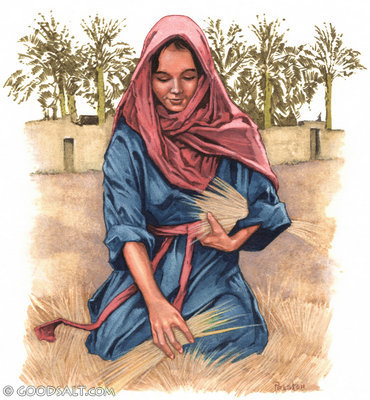[Because of the length of this passage, I'm not going to quote the whole thing, but rather refer to particular verses in it.]
Do you ever read portions of Scripture which just move your heart? Portions that give you a particular sense of gratitude to God and peace in His covenant? For me, Ruth, chapters 1 and 2, were such a portion. While I definitely believe that Ruth is historical, not allegorical, I also see in it strong and gratifying types of Jesus Christ, the ultimate biological expression of the events of the book.
In the first verse, we are introduced to Boaz, a kinsman of Ruth's late husband. In Hebrew, his name means "in him is strength," one of the clues that he is to be taken as a type for Jesus, his lineal descendant. The typology is reinforced by the placing of the events of the book, except the sojourn in Moab, in Bethlehem. The second verse describes Ruth supporting herself and her mother-in-law, Naomi, through gleaning, a biblical form of support for the indigent, established in Leviticus 19:9-10. See also Deuteronomy 24:19. How beautiful it is to see this type of Christ providing his overflowing benefits to this alien from the covenant!
In verse 12, we have Boaz saying of Ruth, that she had "taken refuge under the wings" of Jehovah, an obvious indication of her true conversion. This was something that hadn't been clear earlier. In Ruth 1:16, Ruth had said that Naomi's God would be her God, but it wasn't clear that this was conversion, rather than mere loyalty to her mother-in-law. We see it confirmed, now, that Ruth had truly received the God of Israel by faith. This is a vibrant example of what is described in James 2:5, "Has not God chosen those who are poor in the world to be rich in faith and heirs of the kingdom?"
In verses 15 and 16, we see Boaz instructing his workers to give Ruth her gleanings, not from the post-harvest field alone, but even from that portion of the harvest which had been gathered for the storehouses. God does indeed bless His people with fruitfulness. He promises this in Deuteronomy 16:15, "The Lord your God will bless you in all your produce and in all the work of your hands." But His blessing isn't just a blessing of sufficiency, but rather a blessing which overflows even to the unbelievers around us! We see this described in Matthew 15:26-28, especially verse 26, "Even the dogs eat the crumbs that fall from their masters' table."
In chapter 1, I described Ruth's envy of Israel's covenantal relationship with Jehovah. Now, here in chapter 2, we see here experiencing second-hand those same covenantal blessings. Why? Because was now herself in covenant with the faithful, covenant-keeping God! This is a type of us! We who were once strangers of the covenant (Ephesians 2:12), have now received the benefits of the covenant, through the Jews (Romans 11:11-12)! This is because Boaz's descendant, Jesus Christ (Matthew 1:5), of whom Boaz was a type, received blessings from His Father to pass to us, His covenant people (John 15:15 and 17:18)! We have gleaned grace, sanctification, and glorification yet to come, typified here by Ruth, from the overflowing blessings of this same covenant-keeping God! To me, that is a source of great joy and comfort!
Sedulius Paschal Work, Book 2
6 hours ago




